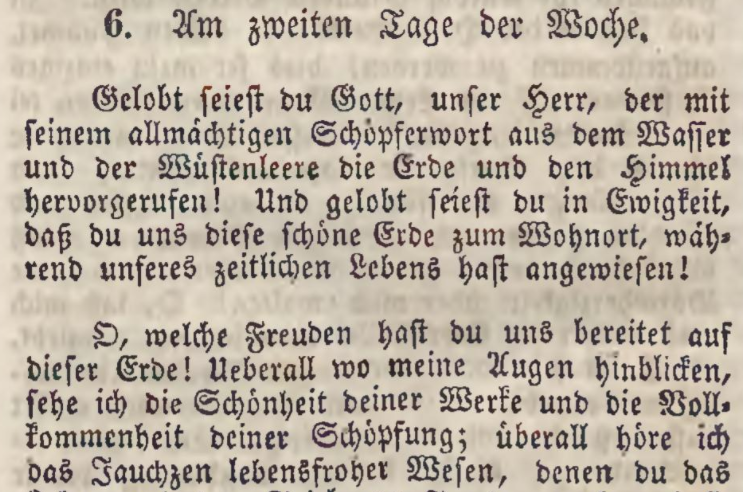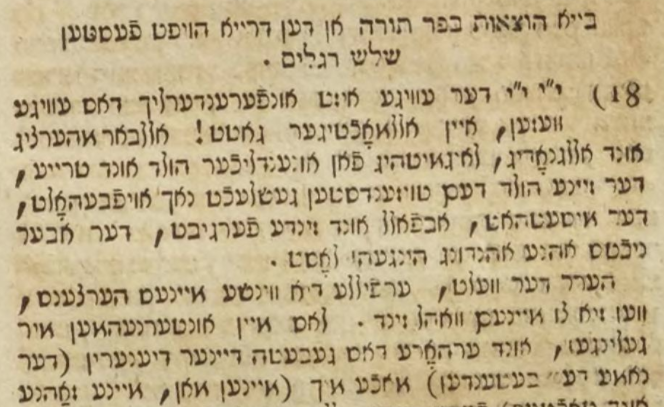| Source (German) | Translation (English) |
|---|---|
Für den ersten Tag des Laubhüttenfestes. |
For the first day of Sukkot. |
Allgütiger Gott, was wären wir Menschen, wenn du dich nicht väterlich herabgelassen hättest, dich unsern Vorältern zu offenbaren, und sie über deinen Willen zu belehren! Du hast den Menschen mit Verstand und Vernunft geziert, die großen Wahrheiten zu erforschen, daß du der Schöpfer und Erhalter der Welt bist, der Lenker und Leiter unserer Schicksale, und daß wir der Erde nicht angehören, daß wir nur eine Pilgerreise durch dieses Leben machen, daß dieses Leben nur der Durchgangspunkt ist zum wahren Leben, in den Gefilden der Seligkeit, wo die wahre Freude wohnt. Wie spät aber die Menschheit aus eigener Kraft diese Wahrheiten erforscht hätte, das sehen wir ja dadurch, daß heute noch Millionen von Heiden im Finstern wandeln. Und wie leicht würden wir diese beseligende Lehre vergessen, hätte deine göttliche Weisheit nicht Zeremonialgesetze gegeben, Verordnungen und Gebräuche, durch deren Ausübung wir an dein heiliges Wort der Wahrheit erinnert werden. |
All-good God, what would we human beings be if you had not deigned in a fatherly way to reveal yourself to our forefathers and to instruct them about your will! You have graced people with understanding and reason to investigate the great truths that you are the creator and sustainer of the world, the guide and director of our destinies, and that we do not belong to the earth, that we only make a pilgrimage through this life, that this life is only the point of passage to the true life, in the realms of bliss, where true joy dwells. But how late mankind would have explored these truths on its own, we can see by the fact that today millions of heathens still walk in darkness. And how easily we would forget these blessed teachings if your divine wisdom had not given ceremonial laws, ordinances and customs, by the practice of which we are reminded of your hallowed word of truth. |
Nicht aber das bloße gedankenlose Thun ist es, wodurch wir dir wohlgefällig zu werden hoffen dürfen; die Gesinnung die wir mit der Handlung verbinden ist es, die unsere Handlung veredelt und uns besser macht. „Sieben Tage sollt ihr in Laubhütten wohnen, damit eure Nachkommen es wissen, daß ich die Kinder Israels habe in Hütten wohnen lassen, als ich sie aus Egyten geführt; ich, der Ewige euer Gott.” (3. Mose 23, 42-43) |
But it is not the mere thoughtless action by which we may hope to please you; it is the attitude which we associate with the action which ennobles our action and makes us better. “Seven days shall you dwell in sukkot, that your descendants may know that I caused the children of Israel to dwell in sukkot, when I brought them out of Egypt: I, the Eternal your God.” (Leviticus 23:42-43) |
O, daß wir alle mit treuem, frommen Herzen in Gottes Wegen wandelten, wie unsere Vorfahren, von denen Gott spricht: „Ich gedenke dir die Güte deiner Jugend, wie du mir nachfolgtest nach der Wüste, nach einem unbesäeten Lande.” (Jeremia 2,2) Dann wird es uns auf unserer Pilgerfahrt so wenig fehlen, als es unsern Vorfahren vierzig Jahre in der Wüste gefehlt hat. Wenn uns nur die Wahrheit recht klar geworden ist, daß wir Pilger auf Erden sind; auf Erden, wo es keine reine Freude, keine unvermischte Glückseligkeit giebt, wo alles dem Unbestand und der Eitelkeit unterworfen ist; dann werden wir auch begreifen, daß wir hier nur zu einem höheren, besseren Leben erzogen werden. — Damit diese Erinnerung in unserem Herzen fortlebe, sollen wir in diesen Tagen unser Haus verlassen und Hütten bewohnen. |
O that we all walked in God’s ways with a faithful, pious heart, like our forefathers of whom God says: “I remember the goodness of your youth, how you followed me into the wilderness, into a land not sown.” (Jeremiah 2:2) Then we will lack as little on our pilgrimage as our ancestors lacked forty years in the wilderness. If only the truth has become quite clear to us that we are pilgrims on earth; on earth where there is no pure joy, no unmixed bliss, where everything is subject to vanity; then we will also understand that we are only being educated here to a higher, better life. — In order that this memory may live on in our hearts, we should leave our house and inhabit huts in these days. |
Wie beruhigend ist der Gedanke: ich bin ein Pilger auf Erden, aber der allgütige Gott hat mir das Ziel der Reise gestellt und leitet mich dahin. Wenn nicht alle Wege meines Lebens gleich eben, gleich sicher und angenehm sind; wenn ich oft im Dunkeln, oft auf rauhen gefährlichen Wegen einsam wandle, oft des Tages Last und Hitze tragen, und vergeblich nach Erquickung schmachten muß, dann tröste mich der Gedanke: ich bin ja nur ein Pilger auf Erden! Bin ich ein Pilger, so darf es mich ja nicht befremden, wenn mich der Anblick des Himmels bald erheitert, bald erschreckt; wenn ich alle Annehmlichkeiten und alle Beschwerden der verschiedenen Tages- und Jahreszeiten wechselweise erfahren, wenn ich bald zwischen Blumen, bald zwischen Dornen dahin gehe; wenn mir bald angenehme, bald widrige Zufälle begegnen; wenn ich bald Hindernisse und Widerstand, bald Aufmunterung und Hilfe finde. Unter deiner Aufsicht, o Allmächtiger, unter deinem Schutze setze ich den Weg meines Lebens fort, du leitest mich, und der Ausgang deiner Wege ist Seligkeit. Erhalte und stärke uns, mein Gott, in diesen Gesinnungen, laß es uns nie vergessen, daß wir dir angehören, und daß du uns leitest. Und führe den Tag herbei, von dem es heißt (Jesaias 4, 5-6.): „Der Ewige wird für Ẓion und seine Festversammlungen, Tages eine schützende Wolke und Nachts Feuerglanz erschaffen und alles Herrliche damit bedecken. Eine Laubhütte wird ihnen zum Schutz dienen vor des Tages Hitze, zum Schutz und zur Zuflucht vor Sturm und Ungewitter.” Amen. |
How reassuring is the thought: I am a pilgrim on earth, but the all-good God has set me the goal of the journey and guides me there. If not all the paths of my life are equally smooth, equally safe and pleasant; if I often walk lonely in the dark, often on rough dangerous paths, often bear the burden and heat of the day, and must pine in vain for refreshment, then I am comforted by the thought: I am only a pilgrim on earth! If I am a pilgrim, I must not be disconcerted if the sight of heaven sometimes exhilarates me, sometimes frightens me; if I experience all the comforts and all the discomforts of the different seasons of the day and of the year alternately, if I walk sometimes among flowers, sometimes among thorns; if I encounter sometimes pleasant, sometimes adverse coincidences; if I find sometimes obstacles and resistance, sometimes encouragement and help. Under your supervision, O Almighty, under your protection I continue the path of my life, you guide me, and the outcome of your ways is bliss. Sustain and strengthen us, my God, in these sentiments; let us never forget that we belong to you and that you guide us. And bring about the day of which it is said: “The Eternal will create for Ẓion and its festive assemblies, a protective cloud by day and the glow of fire by night, and will cover everything glorious with it. A tabernacle of leaves will be their shelter from the heat of the day, their protection and refuge from storm and tempest” (Isaiah 4:5-6). Amen. |
“Für den ersten Tag des Laubhüttenfestes” was translated/adapted by Yehoshua Heshil Miro and published in his anthology of teḥinot, בית יעקב (Beit Yaaqov) Allgemeines Gebetbuch für gebildete Frauen mosaicher Religion. It first appears in the 1829 edition, תחנות Teḥinot ein Gebetbuch für gebildete Frauenzimmer mosaicher Religion as teḥinah №48 on pp. 68-70. In the 1835 edition, it appears as teḥinah №50 pp. 86-88. In the 1842 edition, it appears as teḥinah №52 on pp. 91-93.
We welcome corrections and improvements. The transcription of the German from Latin script in Fraktur type provided machine-readable text for a machine translation by DeepL, which we then edited for accuracy and clarity. I have labeled this historic prayer as problematic due to its patronizing attitude towards “heathens” and its response to suffering through disassociation with this world. –Aharon Varady
Source(s)



“Für den ersten Tag des Laubhüttenfestes [no.1] | For the first day of Sukkot (no.1), a teḥinah by Yehoshua Heshil Miro (1829)” is shared through the Open Siddur Project with a Creative Commons Attribution-ShareAlike 4.0 International copyleft license.

![Für den ersten Tag des Laubhüttenfestes [no.2] (Yehoshua Heshil Miro 1829) - cropped](https://opensiddur.org/wp-content/uploads/2022/03/Fur-den-ersten-Tag-des-Laubhuttenfestes-no.2-Yehoshua-Heshil-Miro-1829-cropped.png)

![[Gebet] An den ersten Tagen des Laubhüttenfestes | [A prayer] on the first days of Sukkot by Fanny Neuda (1855)](https://opensiddur.org/wp-content/uploads/2012/09/stunden-der-andacht-page_082.png)


![[Gebet] An den letzten Tagen des Laubhüttenfestes | [A prayer] on the last days of Sukkot, by Fanny Neuda (1855)](https://opensiddur.org/wp-content/uploads/2017/10/stunden-der-andacht-page_095.png)



Leave a Reply